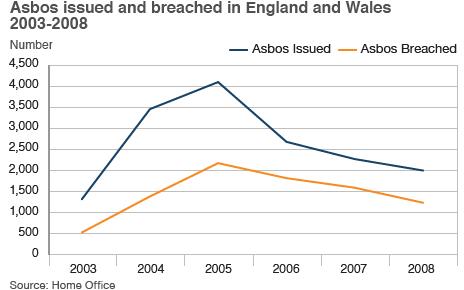Time to 'move beyond' Asbos, says home secretary May
- Published
Theresa May: "People who are closest to the problem have to be driving the solution"
The home secretary has said it is "time to move beyond" Asbos, signalling the possible end of their use in England and Wales.
Launching a review of the system, Theresa May said it was time to "stop tolerating" bad behaviour.
More than half of Asbos in England and Wales were breached from 2000 to 2008, government figures show., external
But Labour, which devised Asbos, said they had made a "huge contribution" to cutting crime.
The Asbo - the "anti-social behaviour order" - was brought in to deal with persistent minor offenders whose actions might not otherwise have been punished.
It imposes restrictions, such as banning people from a local area or preventing them from swearing in public. If an Asbo is breached, offenders can face jail.
Mrs May said she wanted a review of the powers, external because police should be able to use their "common sense" to deal with anti-social behaviour.
Punishments should be "rehabilitative and restorative", rather than "criminalising", she argued.
Speaking in London, Mrs May said: "We need a complete change in emphasis, with people and communities working together to stop bad behaviour escalating."
She also said: "We need to make anti-social behaviour what it once was - abnormal and something to stand up to... rather than frequent and tolerated."
Ministry of Justice figures show 55% of the almost 17,000 Asbos issued between June 2000 and December 2008 were breached, leading to an immediate custodial sentence in more than half of the cases.
Mrs May said: "Anti-social behaviour still blights lives, wrecks communities and provides a pathway to criminality.
"It might sometimes feel like an unwinnable battle but it's not. There is nothing inevitable about crime and there is nothing inevitable about anti-social behaviour.
"By coming together, and only by coming together, we can win this battle."
BBC home affairs correspondent Danny Shaw said the speech signalled a "fundamental shift" in thinking away from that of the previous government, adding: "It seems Asbos won't be around much longer."
For Labour, shadow home secretary Alan Johnson said Mrs May was showing "a lack of understanding about the powers already available to the police".
He added: "An anti-social behaviour order is one of a series of different powers available to the police and is used when other punitive measures have failed...
"Of course it is right to keep such matters under review to ensure the public has speedy access to measures to stop anti-social behaviour. However, there is no doubt that the introduction of Asbos have made a huge contribution towards tackling crime and anti-social behaviour.
"If the home secretary is to restrict the opportunities for the police to use Asbos and other measures currently available then this will be yet another example of this government going soft on crime".
'Wider debate'
Owen Sharp, interim chief executive of the charity Victim Support, said: "We echo Theresa May's comments that anti-social behaviour orders aren't a silver bullet, but there has to be a recognition that sometimes to get anti-social behaviour to stop then sanctions such as Asbos are needed."
Simon Edens, of the Association of Chief Police Officers, said: "Any proposals that enable agencies and communities to better deal with anti-social behaviour are to be welcomed.
"We look forward to more details, and the opportunity to engage in a wider debate."
It will be up to ministers in Scotland and Northern Ireland to decide what to do, if anything, with Asbos, as they are a devolved matter there.
Mrs May's comments come after the government unveiled plans to overhaul licensing laws, with the home secretary describing alcohol misuse as a major cause of violence.
Measures include making it easier for communities to influence licensing decisions in England and Wales, with retailers selling alcohol to children receiving tougher penalties.

- Published28 July 2010
- Published29 July 2010
- Published28 July 2010